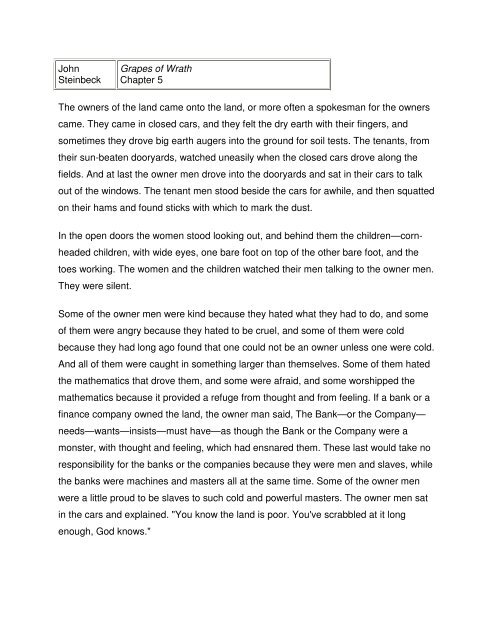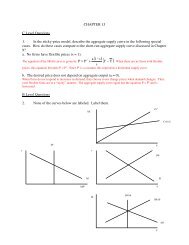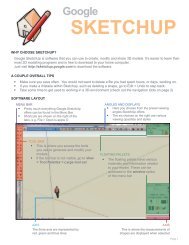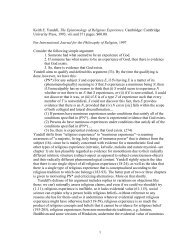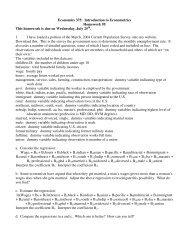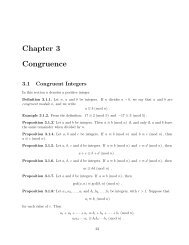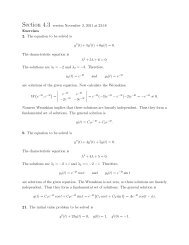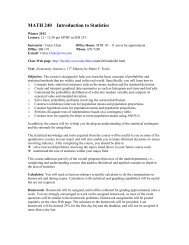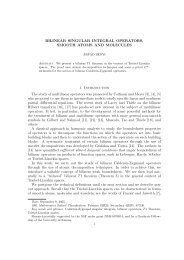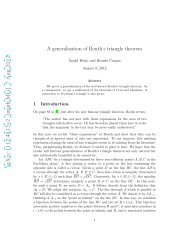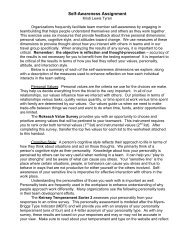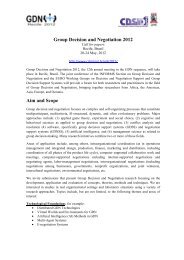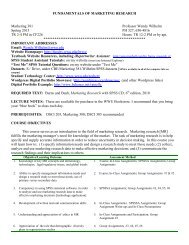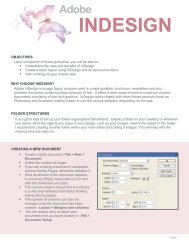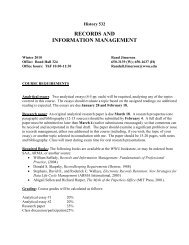John Steinbeck Grapes of Wrath Chapter 5 The owners of ... - Rohan
John Steinbeck Grapes of Wrath Chapter 5 The owners of ... - Rohan
John Steinbeck Grapes of Wrath Chapter 5 The owners of ... - Rohan
Create successful ePaper yourself
Turn your PDF publications into a flip-book with our unique Google optimized e-Paper software.
<strong>John</strong><strong>Steinbeck</strong><strong>Grapes</strong> <strong>of</strong> <strong>Wrath</strong><strong>Chapter</strong> 5<strong>The</strong> <strong>owners</strong> <strong>of</strong> the land came onto the land, or more <strong>of</strong>ten a spokesman for the <strong>owners</strong>came. <strong>The</strong>y came in closed cars, and they felt the dry earth with their fingers, andsometimes they drove big earth augers into the ground for soil tests. <strong>The</strong> tenants, fromtheir sun-beaten dooryards, watched uneasily when the closed cars drove along thefields. And at last the owner men drove into the dooryards and sat in their cars to talkout <strong>of</strong> the windows. <strong>The</strong> tenant men stood beside the cars for awhile, and then squattedon their hams and found sticks with which to mark the dust.In the open doors the women stood looking out, and behind them the children—cornheadedchildren, with wide eyes, one bare foot on top <strong>of</strong> the other bare foot, and thetoes working. <strong>The</strong> women and the children watched their men talking to the owner men.<strong>The</strong>y were silent.Some <strong>of</strong> the owner men were kind because they hated what they had to do, and some<strong>of</strong> them were angry because they hated to be cruel, and some <strong>of</strong> them were coldbecause they had long ago found that one could not be an owner unless one were cold.And all <strong>of</strong> them were caught in something larger than themselves. Some <strong>of</strong> them hatedthe mathematics that drove them, and some were afraid, and some worshipped themathematics because it provided a refuge from thought and from feeling. If a bank or afinance company owned the land, the owner man said, <strong>The</strong> Bank—or the Company—needs—wants—insists—must have—as though the Bank or the Company were amonster, with thought and feeling, which had ensnared them. <strong>The</strong>se last would take noresponsibility for the banks or the companies because they were men and slaves, whilethe banks were machines and masters all at the same time. Some <strong>of</strong> the owner menwere a little proud to be slaves to such cold and powerful masters. <strong>The</strong> owner men satin the cars and explained. "You know the land is poor. You've scrabbled at it longenough, God knows."
<strong>The</strong> squatting tenant men nodded and wondered and drew figures in the dust, and yes,they knew, God knows. If the dust only wouldn't fly. If the top would only stay on the soil,it might not be so bad.<strong>The</strong> owner men went on leading to their point: "You know the land's getting poorer. Youknow what cotton does to the land; robs it, sucks all the blood out <strong>of</strong> it."<strong>The</strong> squatters nodded—they knew, God knew. If they could only rotate the crops theymight pump blood back into the land.Well, it's too late. And the owner men explained the workings and the thinkings <strong>of</strong> themonster that was stronger than they were. "A man can hold land if he can just eat andpay taxes; he can do that.""Yes, he can do that until his crops fail one day and he has to borrow money from thebank.”“But—you see, a bank or a company can't do that, because those creatures don'tbreathe air, don't cat side-meat. <strong>The</strong>y breathe pr<strong>of</strong>its; they eat the interest on money. Ifthey don't get it, they die the way you die without air, without side-meat. It is a sad thing,but it is so. It is just so."<strong>The</strong> squatting men raised their eyes to understand. "Can't we just hang on? Maybe thenext year will be a good year. God knows how much cotton next year. And with all thewars—God knows what price cotton will bring. Don't they make explosives out <strong>of</strong>cotton? And uniforms? Get enough wars and cotton’ll hit the ceiling. Next year, maybe."<strong>The</strong>y looked up questioningly."We can't depend on it. <strong>The</strong> bank—the monster has to have pr<strong>of</strong>its all the time. It can'twait. It'll die. No, taxes go on. When the monster stops growing, it dies. It can't stay onesize."S<strong>of</strong>t fingers began to tap the sill <strong>of</strong> the car window, and hard fingers tightened on therestless drawing sticks. In the doorways <strong>of</strong> the sun-beaten tenant houses, women
sighed and then shifted feet so that the one that had been down was now on top, andthe toes working. Dogs came sniffing near the owner cars and wetted on all four tiresone after another. And chickens lay in the sunny dust and fluffed their feathers to getthe cleansing dust down to the skin. In the little sties the pigs grunted inquiringly overthe muddy remnants <strong>of</strong> the slops.<strong>The</strong> squatting men looked down again. "What do you want us to do? We can't take lessshare <strong>of</strong> the crop—we're half starved now. <strong>The</strong> kids are hungry all the time. We got noclothes, torn an' ragged. If all the neighbors weren't the same, we'd he ashamed to go tomeeting."And at last the owner men came to the point. "<strong>The</strong> tenant system won't work, any more.One man on a tractor can take the place <strong>of</strong> twelve or fourteen families. Pay him a wageand take all the crop. We have to do it. We don't like to do it. But the monster's sick.Something's happened to the monster.""But you'II kilI the land with cotton.""We know. We’ve got to take the cotton quick before the land dies. <strong>The</strong>n we’ll sell theland. Lots <strong>of</strong> families in the East would like to own a piece <strong>of</strong> land."<strong>The</strong> tenant men looked up alarmed. "But what’ll happen to us? How’ll we eat?""You’ll have to get <strong>of</strong>f the land. <strong>The</strong> plows’ll go through the dooryard."And now the squatting men stood up angrily. "Grampa took up the land, and he had tokill the Indians and drive them away. And Pa was born here, and he killed weeds andsnakes. <strong>The</strong>n a bad year came and he had to borrow a little money. An’ we was bornhere. <strong>The</strong>re in the door—our children born here. And Pa had to borrow money. <strong>The</strong>bank owned the land then, but we stayed and we got a little bit <strong>of</strong> what we raised.""We know that—all that. It’s not us, it’s the bank. A bank isn’t like a man. Or an ownerwith fifty thousand acres, he isn’t like a man either. That’s the monster."
"Sure," cried the tenant men, "but it’s our land. We measured it and broke it up. Wewere born on it, and we got killed on it, died on it. Even if it’s no good, it’s still ours.That’s what makes it ours—being born on it, working it, dying on it. That makes<strong>owners</strong>hip, not a paper with numbers on it.""We’re sorry. It’s not us. It’s the monster. <strong>The</strong> bank isn’t like a man.""Yes, but the bank is only made <strong>of</strong> men.""No, you’re wrong there—quite wrong there. <strong>The</strong> bank is something else than men. Ithappens that every man in a bank hates what the bank does, and yet the bank does it.<strong>The</strong> bank is something more than men, I tell you. It’s the monster. Men made it, but theycan’t control it."<strong>The</strong> tenants cried, "Grampa killed Indians, Pa killed snakes for the land. Maybe we cankill banks—they're worse than Indians and snakes. Maybe we got to fight to keep ourland, like Pa and Granpa did."And now the owner men grew angry. "You’ll have to go.""But it's ours," the tenant men cried. "We—""No. <strong>The</strong> bank, the monster owns it. You'll have to go.""We'll get our guns, like Granpa when the Indians came. What then?""Well—first the sheriff, and then the troops. You'll be stealing if you try to stay, you'll bemurderers if you kill to stay. <strong>The</strong> monster isn't men, but it can make men do what itwants.""But if we go, where'll we go? How'll we go? We got no money.""We're sorry," said the owner men. "<strong>The</strong> bank, the fifty-thousand-acre owner can't beresponsible. You're on land that isn't yours. Once over the line maybe you can pickcotton in the fall. Maybe you can go on relief. Why don't you go on west to California?
<strong>The</strong>re's work there, and it never gets cold. Why, you can reach out anywhere and pickan orange. Why, there's always some kind <strong>of</strong> crop to work in. Why don't you go there?"And the owner men started their cars and rolled away.<strong>The</strong> tenant men squatted down on their hams again to mark the dust with a stick, t<strong>of</strong>igure, to wonder. <strong>The</strong>ir sun- burned faces were dark, and their sun-whipped eyes werelight. <strong>The</strong> women moved cautiously out <strong>of</strong> the doorways toward their men, and thechildren crept behind the women, cautiously, ready to run. <strong>The</strong> bigger boys squattedbeside their fathers, because that made them men. After a time the women asked, Whatdid he want?And the men looked up for a second, and the smolder <strong>of</strong> pain was in their eyes. "We gotto get <strong>of</strong>f. A. tractor and a superintendent. Like factories."Where'll we go? the women asked."We don't know. We don't know."And the women went quickly, quietly back into the houses and herded the childrenahead <strong>of</strong> them. <strong>The</strong>y knew that a man so hurt and so perplexed may turn in anger, evenon people he loves. <strong>The</strong>y left the men alone to figure and to wonder in the dust.After a time perhaps the tenant man looked about—at the pump put in ten years ago,with a goose-neck handle and iron flowers on the spout, at the chopping block where athousand chickens had been killed, at the hand plow lying in the shed, and the patentcrib hanging in the rafters over it.<strong>The</strong> children crowded about the women in the houses. What we going to do, Ma?Where we going to go?<strong>The</strong> women said, We don't know, yet. Go out and play. But don't go near your father. Hemight whale you if you go near him. And the women went on with the work, but all thetime they watched the men squatting in the dust—perplexed and figuring.
<strong>The</strong> tractors came over the roads and into the fields, great crawlers moving like insects,having the incredible strength <strong>of</strong> insects. <strong>The</strong>y crawled over the ground, laying the trackand rolling on it and picking it up. Diesel tractors, puttering while they stood idle; theythundered when they moved, and then settled down to a droning roar. Snub-nosedmonsters raising the dust and sticking their snouts into it, straight down the country,across the country, through fences, through dooryards, in and out <strong>of</strong> gullies in straightlines. <strong>The</strong>y did not run on the ground, but on their own roadbeds. <strong>The</strong>y ignored hills andgulches, water courses, houses.<strong>The</strong> man sitting in the iron seat did not look like a man; gloved, goggled, rubber dustmask over nose and mouth, he was a part <strong>of</strong> the monster, a robot in the seat. <strong>The</strong>thunder <strong>of</strong> the cylinders sounded through the country, became one with the air and theearth, so that earth and air muttered in sympathetic vibration. <strong>The</strong> driver could notcontrol it—straight across country it went, cutting through a dozen farms and straightback. A twitch at the controls could swerve the cat', but the driver's hands could nottwitch because the monster that built the tractor, the monster that sent the tractor out,had somehow got into the driver’s hands, into his brain and muscle, had goggled himand muzzled him—goggled his mind, muzzled his speech, goggled his perception,muzzled his protest., He could not see the land as it was, he could not smell the land asit smelled; his feet did not stamp the clods or feel the warmth and power <strong>of</strong> the earth. Hesat in an iron seat and stepped on iron pedals. He could not cheer or beat or curse orencourage the extension <strong>of</strong> his power, and because <strong>of</strong> this he could not cheer or whipor curse or encourage himself. He did not know or own or trust or beseech the land. If aseed dropped did not germinate, it was nothing. If the young thrusting plant withered indrought or drowned in a flood <strong>of</strong> rain, it was no more to the driver than to the tractor.He loved the land no more than the bank loved the land. He could admire the tractor—its machined surfaces, its surge <strong>of</strong> power, the roar <strong>of</strong> its detonating cylinders; but it wasnot his tractor. Behind the tractor rolled the shining disks, cutting the earth with blades—not plowing but surgery, pushing the cut earth to the right where the second row <strong>of</strong> diskscut it and pushed it to the left; slicing blades shining, polished by the cut earth. Andpulled behind the disks, the harrows combing with iron teeth so that the little clods broke
up and the earth lay smooth. Behind the harrows, the long seeders—twelve curved ironpenes erected in the foundry, orgasms set by gears, raping methodically, raping withoutpassion. <strong>The</strong> driver sat in his iron seat and he was proud <strong>of</strong> the straight lines he did notwill, proud <strong>of</strong> the tractor he did not own or love, proud <strong>of</strong> the power he could not control.And when that crop grew, and was harvested, no man had crumbled a hot clod in hisfingers and let the earth sift past his fingertips. No man had touched the seed, or lustedfor the growth. Men ate what they had not raised, had no connection with the bread.<strong>The</strong> land bore under iron, and under iron gradually died; for it was not loved or hated, ithad no prayers or curses.At noon the tractor driver stopped sometimes near a tenant house and opened hislunch: sandwiches wrapped in waxed paper, white bread, pickle, cheese, Spam, a piece<strong>of</strong> pie branded like an engine part. He ate without relish. And tenants not yet movedaway came out to see him, looked curiously while the goggles were taken <strong>of</strong>f, and therubber dust mask, leaving white circles around the eyes and a large white circle aroundnose and mouth. <strong>The</strong> exhaust <strong>of</strong> the tractor puttered on, for fuel is so cheap it is moreefficient to leave the engine running than to heat the Diesel nose for a new start.Curious children crowded close, ragged children who ate their fried dough as theywatched. <strong>The</strong>y watched hungrily the unwrapping <strong>of</strong> the sandwiches, and their hungersharpenednoses smelled the pickle, cheese, and Spam. <strong>The</strong>y didn't speak to the driver.<strong>The</strong>y watched his hand as it carried food to his mouth. <strong>The</strong>y did not watch him chewing;their eyes followed the hand that held the sandwich. After awhile the tenant who couldnot leave the place came out and squatted in the shade beside the tractor."Why, you're Joe Davis's boy'!""Sure," the driver said."W ell, what you doing this kind <strong>of</strong> work for—against your own people?""Three dollars a day. I got damn sick <strong>of</strong> creeping for my dinner—and not getting it. I gota wife and kids. We got to eat. Three dollars a day, and it comes every day."
"That's right," the tenant said. "But for your three dollars a day fifteen or twenty familiescan't eat at all. Nearly a hundred people have to go out and wander on the roads foryour three dollars a day. Is that right?"And the driver said, "Can’t think <strong>of</strong> that. Got to think <strong>of</strong> my own kids. Three dollars a day,and it comes every day. Times are changing, mister, don't you know? Can't make aliving on the land unless you've got two, five, ten thousand acres and a tractor. Cropland isn't for little guys like us any more. You don't kick up a howl because you can'tmake Fords, or because you're not the telephone company. Well, crops are like thatnow. Nothing to do about it. You try to get three dollars a day someplace. That's theonly way."<strong>The</strong> tenant pondered. "Funny thing how it is. If a man owns a little property, thatproperty is him, it's part <strong>of</strong> him, and it's like him. If he owns property only so he can walkon it and handle it and be sad when it isn't doing well, and feel fine when the rain fallson it, that property is him, and some way he's bigger because he owns it. Even if he isn'tsuccessful he’s big with his property. That is so.”And the tenant pondered more. “But let a man get property he doesn’t see, or can’t taketime to get his fingers in, or can’t be there to walk on it—why, then the property is theman. He can't do what he wants, he can't think what he wants. <strong>The</strong> property is the man,stronger than he is. And he is small, not big. Only his possessions are big—and he's theservant <strong>of</strong> his property. That is so, too."<strong>The</strong> driver munched the branded pie and threw the crust away. "Times are changed,don't you know? Thinking about stuff like that don't feed the kids. Get your three dollarsa day, feed your kids. You got no call to worry about anybody's kids but your own. Youget a reputation for talking like that, and you'll never get three dollars a day. Big shotswon't give you three dollars a day if you worry about anything but your three dollars aday."
"Nearly a hundred people on the road for your three dollars. Where will we go?""And that reminds me," the driver said, "you better get out soon. I'm going through thedooryard' after dinner.""You filled in the well this morning.""I know. Had to keep the line straight. But I'm going through the dooryard after dinner.Got to keep the lines straight. And—well, you know Joe Davis, my old man, so I'll tellyou this. I got orders wherever there's a family not moved out—if I have an accident—you know, get too close and cave the house in a little—well, I might get a couple <strong>of</strong>dollars. .And my youngest kid never had no shoes yet.""I built it with my hands. Straightened old nails to put the sheathing on. Rafters are wiredto the stringers with baling wire. It's mine. I built it. You bump it down—I'll be in thewindow with a rifle. You even come too close and I'll pot you like a rabbit.""It's not me. <strong>The</strong>re's nothing I can do. I'II lose my job if I don't do it. And look—supposeyou kill me? <strong>The</strong>y'll just hang you, but long before you're hung there'll be another guy onthe tractor, and he'll bump the house down. You're not killing the right guy.""That's so," the tenant said. “Who gave you orders? I'll go after him. He's the one to kill."“You're wrong. He got his orders from the bank. <strong>The</strong> bank told him, 'Clear those peopleout or it's your job.' ""Well, there's a president <strong>of</strong> the bank. <strong>The</strong>re's a board <strong>of</strong> directors. I'll fill up themagazine <strong>of</strong> the rifle and go into the bank."<strong>The</strong> driver said, "Fellow was telling me the bank gets orders from the East. <strong>The</strong> orderswere, 'Make the land show pr<strong>of</strong>it or we'll close you up.' "“But where does it stop? Who can we shoot? I don't aim to starve to death before I killthe man that's starving me."
"I don't know. Maybe there's nobody to shoot. Maybe the thing isn't men at all. Maybe,like you said, the property's doing it. Anyway I told you my orders."“I got to figure," the tenant said. "We all got to figure. <strong>The</strong>re’s some way to stop this. It'snot like lightning or earthquakes. We've got a bad thing made by men, and by Godthat's something we can change." <strong>The</strong> tenant sat in his doorway, and the driverthundered his engine and started <strong>of</strong>f, tracks falling and curving, harrows combing, andthe phalli <strong>of</strong> the seeder slipping into the ground. Across the dooryard the tractor cut, andthe hard, foot-beaten ground was seeded field, and the tractor cut through again; theuncut space was ten feet wide. And back he came. <strong>The</strong> iron guard bit into the housecorner,crumbled the wall, and wrenched the little house from its foundation so that it fellsideways, crushed like a bug. And the driver was goggled and a rubber mask coveredhis nose and mouth. <strong>The</strong> tractor cut a straight line on, and the air and the groundvibrated with its thunder. <strong>The</strong> tenant man stared after it, his rifle in his hand. His wifewas beside him, and the quiet children behind. And all <strong>of</strong> them stared after the tractor.


